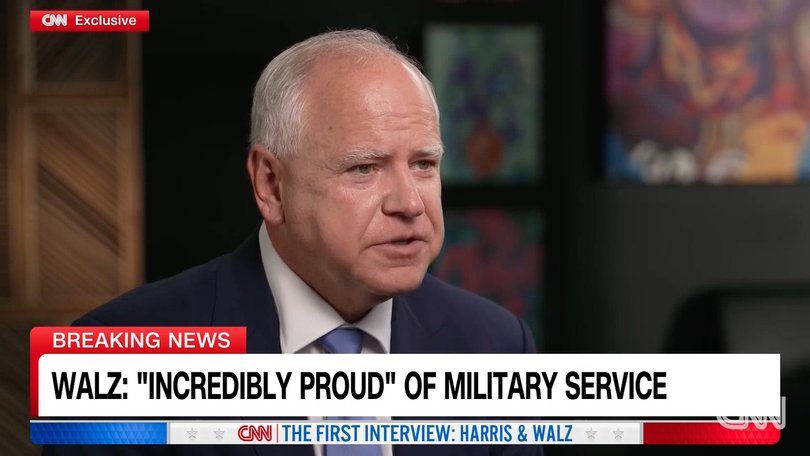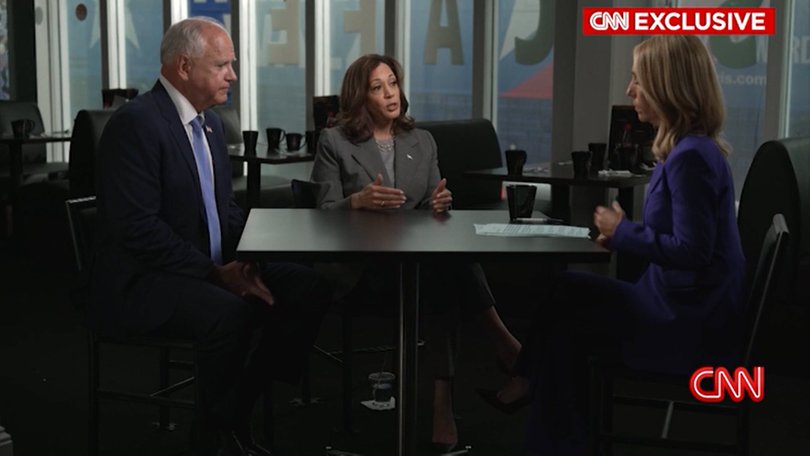THE NEW YORK TIMES: Tim Walz is happy to help, content to be ignored

In their joint television interview Thursday night, Vice President Kamala Harris and Governor Tim Walz of Minnesota were seated in a way that made him appear twice her height. But Walz understood his main assignment: Don’t overshadow your running mate.
Still, in his scarce speaking time — about 705 words in all — as he was pressed to answer for past misstatements and exaggerations, or to answer personal questions, he managed to deflect and then appeal to a broader point.
“I certainly own my mistakes when I make them,” Walz said, closing out a somewhat meandering answer to questions about inconsistencies in his past descriptions of his military service, a 1995 drunk-driving arrest and the fertility treatment that he and his wife used to conceive their children.
Sign up to The Nightly's newsletters.
Get the first look at the digital newspaper, curated daily stories and breaking headlines delivered to your inbox.
By continuing you agree to our Terms and Privacy Policy.The CNN interview, of course, was mostly a test of Harris.
Walz has made it abundantly clear, in the last 3½ weeks, that he does not need to be the centre of attention — a defining feature of his candidacy is a lack of naked personal ambition, paired with effusive enthusiasm for his running mate.
He appears happy to be the guy sitting off to the side, just out of frame, perfectly content to be ignored — he did not speak for long stretches of the interview — but also happy to help.

Walz’s presence was somewhat unusual.
It was Harris’ first television interview since President Joe Biden dropped out of the race, and the fact that she brought Walz along with her, like a wingman, did not go unremarked by her opponent.
On Thursday morning, former President Donald Trump criticised her for having Walz there.
When the camera turned to Walz — when he was pressed to own his mistakes — he turned the question about military service into an answer about gun safety, and the question about fertility treatment into an answer about reproductive rights.
He has said on the campaign trail that he and his wife, Gwen, used in vitro fertilisation to conceive. In fact, they used another common procedure, intrauterine insemination, which does not involve the creation of embryos outside the uterus.
“The one thing I’ll tell you is, I wished in this country we wouldn’t have to do this,” Walz said in the interview.
Was he annoyed that he had to answer these kinds of questions? Annoyed that anybody had to?
“I spoke about our infertility issues because it’s hell, and families know this,” he went on. “And I spoke about the treatments that were available to us, that had those beautiful children there. That’s quite a contrast in folks that are trying to, to take those rights away from us.”
In the interview, as he has on the campaign trail, he used pointed questions as an opportunity to present himself as an everyman. “I think people know who I am,” said Walz, who has been in the public eye for about 12 seconds.
Walz has so far connected powerfully with live audiences, at rallies and big speeches, contexts in which his folksy speech patterns and unbridled excitement feed off the energy of a crowd. A sit-down interview, even one in which he is playing a secondary role, is a more stilted environment.
He did not have much opportunity to offer policy proposals Thursday night, although he did somehow work Minnesota’s child tax credit into his first, 77-word answer.
Otherwise, he agreed with Harris and contrasted their ideas with those of the Republican ticket.
Toward the end of the interview, he was asked to reflect on his son, Gus, whose emotional response to his father’s speech at the Democratic National Convention last week was an unscripted soft spot in the proceedings.
“I’m grateful for so many reasons to be on this ticket,” Walz said. “But that moment — to understand what was really important, to — to have my son feel a sense of pride in me, that I was trying to do the right thing.”
He looked to his left, where Harris was sitting — his brow creased — and he seemed briefly overcome with emotion.
This article originally appeared in The New York Times.
© 2024 The New York Times Company
Originally published on The New York Times
